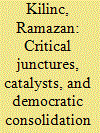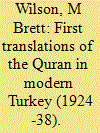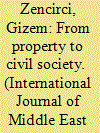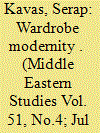|
|
|
Sort Order |
|
|
|
Items / Page
|
|
|
|
|
|
|
| Srl | Item |
| 1 |
ID:
133225


|
|
|
|
|
| Publication |
2014.
|
| Summary/Abstract |
IN FEBRUARY 1997, THE TURKISH MILITARY INTERVENED in politics to protect secularism from the "rising Islamist threat." This intervention resulted in the toppling of the coalition government led by the Islamic-oriented Welfare Party (RP, Refah Partisi). Many civil and political restrictions followed this intervention, including the closure of the RP by the Constitutional Court. Two years later, the Chief of Staff, Hüseyin K?vr?ko?lu, stated that "the 28 February process," by which he meant the military-sanctioned political configuration,would continue for one thousand years if necessary.1 However, by 2012, only 15 years after the intervention, the military's ability to shape politics has diminished notably. By any measure, the civilian oversight of the military is now at its highest level since the first military coup in modern Turkey in 1960.2 The Islamic-oriented Justice and Development Party (AK Party, Adalet ve Kalk?nma Partisi)3 stayed in power for more than a decade. Furthermore, Turkey implemented several democratic reforms that reversed the authoritarian movement of the period immediately after the 1997 military intervention. Additionally, the Parliament passed laws that liberalized the Press Law, Turkish Penal Code, the state policies toward religious minorities, rights for Kurdish minorities, and human rights regulations.4 Since Turkey transited to multi-party politics in 1945, it has experienced four military interventions (1960, 1971, 1980, and 1997); each time, the military built a political system that maintained its influence even after the transfer of power to civilian government. Given Turkey's long history with military tutelage, including its orchestrated effort to redesign Turkish politics in the late 1990s, these liberalizing reforms have been revolutionary for democratic consolidation. Therefore, it can be asked: How did Turkey recover and consolidate its democracy within such a short period?
|
|
|
|
|
|
|
|
|
|
|
|
|
|
|
|
| 2 |
ID:
090269


|
|
|
|
|
| Publication |
2009.
|
| Summary/Abstract |
The debut of Turkish-language translations of the Qur?an in the newly founded Republic of Turkey sparked lively debates over whether Qur?an translation was possible or desirable, who should engage in interpretation of the text, and what characteristics a Turkish-language rendering of the Qur?an should have. Whereas the abolition of the Islamic caliphate, closure of the medreses, and prohibition of the Sufi orders have received considerable attention in histories of early republican Turkey, the state-sponsored translation of the Qur?an into Turkish remains both neglected and misunderstood. Muhammad Rashid Rida, who was highly influential in shaping opinion in the Muslim world, portrayed the state-sponsored project as a long-term plot to displace the Arabic Qur?an. Other accounts misrepresent the involvement of President Mustafa Kemal (Atatürk) in the promotion of Qur?an translation by anachronistically suggesting that he sparked the initiative and led a "campaign" in support of it. Mustafa Kemal had no hand in the composition of Turkish Qur?an translations published in 1924, other than helping create the political context in which they could be published. Their composition began well before the foundation of the Turkish republic, and their inspiration emerged from the intellectual milieu of the late Ottoman public sphere.
|
|
|
|
|
|
|
|
|
|
|
|
|
|
|
|
| 3 |
ID:
140361


|
|
|
|
|
| Summary/Abstract |
In this article, I argue that shifting development discourses have shaped the meaning and function of vakıfs (religious endowments) in Turkey since the establishment of the republic in 1923. I identify three periods defined by their distinctive development discourse, and show how each of these discourses made vakıfs into both an object and a site of development. In the etatist discourse of the 1930s, vakıfs were articulated as national treasures tasked with financing state-led economic development. With the shift to a mixed economy discourse in the 1960s, vakıfs were reconfigured as private philanthropic foundations expected to create a skilled labor force. The neoliberal development discourse of the 1980s transformed vakıfs into welfare organizations focused on poverty. This article shows that in all three of these periods, the relationship between state, Islam, economy, and society was articulated, legitimized, and consolidated with reference to a seemingly stagnant but in fact malleable institution inherited from the Ottoman Empire—the vakıf. I refer to this process as the “local production of development,” a conceptualization emphasizing how global discourses of development are formed and transformed at the local level.
|
|
|
|
|
|
|
|
|
|
|
|
|
|
|
|
| 4 |
ID:
120057


|
|
|
|
|
| Edition |
vol. II
|
| Publication |
Cambridge, Cambridge University Press, 1977.
|
| Description |
xxii,518p.hbk
|
| Contents |
B
|
| Standard Number |
9780521291668
|
|
|
|
|
|
|
|
|
|
|
|
Copies: C:1/I:0,R:0,Q:0
Circulation
| Accession# | Call# | Current Location | Status | Policy | Location |
| 057214 | 949.61/SHA 057214 | Main | On Shelf | General | |
|
|
|
|
| 5 |
ID:
159010


|
|
|
|
|
| Summary/Abstract |
On 25 July 1950, a month after the beginning of the Korean War, the newly elected Democratic Party (DP) in Turkey announced that a brigade would be sent to assist South Korea as part of the UN mission led by the United States. The main argument of this article is that although the DP regime is considered a secular and Kemalist one, the state continued the Ottoman tradition and practice of using Islam to gain support for the war and to mobilize the Turkish nation. To do so, the article will show the similarity of both the means and the content of religious propaganda used in the Korean War to those used in the Ottoman jihad in the First World War. This article suggests that parts of the public understood the war as a religious conflict and not just as an ideological one thus indicating the success of the religious messages and their efficiency.
|
|
|
|
|
|
|
|
|
|
|
|
|
|
|
|
| 6 |
ID:
139306


|
|
|
|
|
| Summary/Abstract |
To a social thinker who is used to dealing with macro aspects of sociopolitical phenomena,
the issue of clothing may sound trifling, or at best may be viewed as an insignificant detail of social life and thus be discounted as secondary. However, what are considered mundane issues may themselves be so heavily loaded and may bear such subtle and unique meanings that inattention to them may result in missing some very important insights allowing a much closer analysis of larger issues, such as the experience of modernization, in particular, in a non-western context. As Comaroff and Comaroff rightly put it, ‘Cultural revolutions usually rooted themselves on modest terrain, in simple acts of fabrication, use, exchange. Even the most elaborate social formations arise from such quotidian acts’.
|
|
|
|
|
|
|
|
|
|
|
|
|
|
|
|
|
|
|
|
|